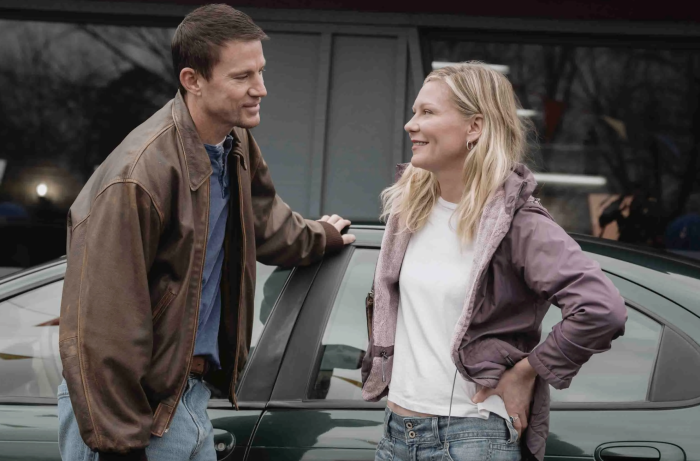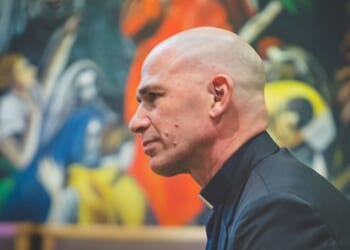
Nearly 20 years after her act of bravery helped end one of North Carolina’s most bizarre crime stories, Leigh Moore says she’s still learning what compassion really means.
“I chose to forgive him,” she told The Christian Post. “He didn’t mean to hurt me. And it’s just easier to forgive than to carry that anger around. You’re only hurting yourself if you hold onto it.”
Her story, one that weaves together betrayal, faith and redemption, is now being told on the big screen in “Roofman,” Paramount Pictures’ new true-crime drama. Channing Tatum stars as Jeffrey Manchester, with Kirsten Dunst as Leigh Moore.
Directed by Derek Cianfrance, the film revisits the saga of Jeffrey Allen Manchester, a charming ex-paratrooper-turned-serial robber who became notorious for breaking into McDonald’s restaurants through their roofs before being captured, imprisoned and later escaping from a North Carolina prison in 2004.
Manchester spent months hiding in a Toys “R” Us store, building a secret nest above the bike racks and living off shelves of M&Ms, before venturing out one Sunday to a nearby church.
It was there that he met Moore, a newly divorced mother of three.
According to Moore, Crossroads Church wasn’t the kind of place where people worried about appearances; everyone felt accepted and loved by the church community, led by Pastor Ron Smith.
“We ate donuts, wore tennis shoes, and nobody cared what you wore or what your background was,” she recalled. “You were just there to serve each other, be supportive and develop friendships.”
That kind of open-armed community is exactly what drew her in and, ultimately, what drew in Manchester, who introduced himself as John Zorn.
“He came in just to sit in the back and not be noticed,” Moore said. “But that didn’t happen. The ladies of the church introduced him to me, and Pastor Ron immediately struck up a friendship with him. Everyone embraced him. He found something he hadn’t had in a long time, which was connection.”
What began as a simple conversation soon became companionship. By the holidays, the two were spending evenings together, decorating Christmas trees and making her kids laugh. “He was like a child at Christmas,” she said. “We went to Target and bought $300 worth of ornaments. He wanted light blue and silver. I used those ornaments for years.”
On Jan. 5, 2005, Moore’s 40th birthday, everything unraveled. Police showed up at her office with a photo and informed her that the man she loved was a dangerous escaped convict.
Despite her initial shock, that night, she helped set a trap to capture him. Manchester arrived at her apartment with flowers in hand, expecting dinner. Officers surrounded him and took him into custody without incident. Moore watched the arrest unfold from a police car down the road.
What came next could have hardened her heart, but instead, it opened it.
“I’m a very forgiving and trusting person,” Moore said. “That can work in your favor or against you. But I understand why he did what he did. He lied about where he came from and what he was doing when he wasn’t with me, but he didn’t lie about who he was as a person. He showed me who he was every day.”
Moore visited Manchester in jail once, for closure, where he apologized repeatedly. Over time, their anger faded into a friendship that still exists today. “We just talk like old friends,” she said. “We still communicate.”
Reflecting on how she reconciles her faith with the pain of betrayal, Moore said, “We all make mistakes. Everybody has something they’re ashamed of and something they’re proud of. None of us is perfect. It’s just easier to let it go.”
For years, Moore kept her story buried, sharing it only with close friends. When she learned that Paramount was turning it into a film, she finally decided to speak.
“I’m glad the story is out there,” she said. “People can quit wondering and gossiping. Maybe they’ll see what he was really like, and maybe they’ll think twice before judging someone too quickly.”
Moore believes her church’s warmth and the grace extended by Pastor Ron and the congregation to Manchester left a lasting mark on him and gave him a sense of belonging he so desperately craved.
After his crimes were uncovered, Moore said she asked Manchester, “Why did you keep coming back to church?”
“He said he came there for the sermon, to sit in the back and listen and just be unnoticed,” she said. “But everyone embraced him, and then it just became so much more. He couldn’t just sit on his hands anymore. He got involved very quickly and seemed really excited about it all, like he just found a new home, or he’d been reborn.”
Today, Moore says she’s doing well and hopes those who watch her story unfold on screen are inspired to extend compassion to those around them and offer forgiveness, no matter how difficult.
“I’ve had 20 years to think about it,” she reflected. “It’s not something I dwell on anymore. I just hope people watching the movie take away the same lesson I did: that forgiveness frees you. Holding onto anger doesn’t.”
“Roofman” is rated R for language, nudity and sexual content, andhits theaters on Oct. 10.
Leah M. Klett is a reporter for The Christian Post. She can be reached at: leah.klett@christianpost.com

















